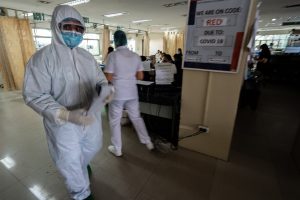ASEAN countries with large populations and major outbreaks of the new coronavirus are building a dependency on Chinese vaccinations in a bid to curb the virus, which has claimed more than 40,000 lives from 1.8 million cases confirmed across the region.
Vaccines are being acquired through a combination of government funds, donations from local businessmen, Chinese and Western largess, and investment deals with the greatest needs emerging from Indonesia, Malaysia, Myanmar, the Philippines, and Thailand.
But the rollout remains in its infancy and is a massive undertaking with governments planning to inoculate up to 70 percent of the region’s 648 million people against COVID-19.
Vaccinations will be free and offered on a voluntary basis with leaders like Indonesia’s Joko Widodo and Cambodia’s Hun Sen leading by example, opting to be the first in their respective countries to receive the inoculation as a way of encouraging others to follow suit.
Chinese vaccines do not have approval from the World Health Organization
The WHO says it expects to approve Western and Chinese vaccines within the “coming weeks and months.” This would make Chinese vaccines available through COVAX, a global scheme co-led by the WHO, which plans to deliver at least two billion COVID-19 doses world-wide this year, with at least 1.3 billion going to poorer countries.
Beijing has proactively engaged in the COVAX program with regional countries in sourcing vaccines, which was on the agenda during the recent tour of the region by Chinese Foreign Minister Wang Yi. Importantly, each person requires two jabs.
Among the biggest takers of the Chinese vaccine is Malaysia.
The country has been in talks to secure a 23.9 million doses from Sinovac and another Chinese manufacturer, CanSino Biologics, and from the makers of the Sputnik V vaccine, Russia’s Gamaleya Institute. It intends to develop its own vaccine at a later date.
Discussions on Wang’s tour included a mix COVID vaccines and bilateral trade deals.
Myanmar was promised 300,000 doses and a commitment to maintain the momentum on bilateral projects, while Wang said Beijing would donate 500,000 doses to the Philippines along with a $77 million grant to finance infrastructure projects.
Jakarta has paid $45 million for three million Sinovac doses with a further 100,000 on order from CanSino as it struggles to get soaring case rates – nearing one million – under control.
Cambodia and Laos – where Chinese influence is greatest within the region – have emerged relatively unscathed with just 453 and 41 confirmed COVID-19 cases, respectively, and no deaths. But anxiety remains high with many workers returning from Thailand turning in positive tests.
Beijing promised it would “ensure the safety” of Laos against the pandemic and offered Cambodia an initial one million doses, which would inoculate 500,000 people. But that’s still a long way short of Cambodia’s hope to inoculate up to 13 million people against the disease.
Thailand, Singapore, Brunei, and Vietnam are taking a broader approach.
Thailand has ordered 63 million doses from a combination of sources, with the first two million doses coming from Sinovac while securing a technology transfer deal with Oxford University-based AstraZeneca, which will enable it to also produce its own vaccines.
Bangkok wants all its citizens vaccinated against the virus, in addition to all illegal workers from Cambodia, Laos, and Myanmar, who will be allowed to stay and work legally for the next two years.
Singapore has received its first batch of the American-German Pfizer-BioNTech vaccine, which it has approved, and is evaluating vaccines by American drug firm Moderna and Sinovac. The nation’s health minister says Singaporeans will not be offered a choice.
Brunei says it is identifying effective and safe vaccine candidates and is securing access to vaccines through multilateral arrangements via COVAX and bilateral arrangements with manufacturers.
Vietnam has placed an order for 30 million doses of COVID-19 vaccines made by AstraZeneca for 15 million people and plans to acquire more through the COVAX facility – with Australia spending $390 million to bolster access among ASEAN countries.
As the world enters COVID-19 Year Two, Southeast Asia’s attempts to combat the pandemic have been patchy at best, but Beijing is winning kudos for its efforts in a region that has grown wary of Chinese expansionism, which is too often tied to investment, soft loans, and other forms of largess.
It’s an effort made all the more noticeable by the dwindling influence of the United States, more preoccupied with the change in administration, but that could change as President Joe Biden takes the helm with promises to bolster U.S. ties with Southeast Asia.
Luke Hunt can be followed on Twitter @lukeanthonyhunt

































